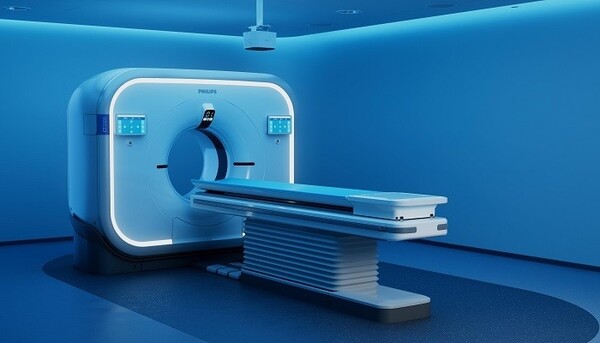Philips Korea said it launched Philips CT 5300, its latest AI-powered CT that enhances productivity and streamlines workflow for radiologists.

The launch aligns with insights from Philips’ Future Health Index 2024 APAC Report, which highlights the growing focus of healthcare leaders worldwide on AI and data integration to address key challenges such as workforce shortages and financial pressures.
In the Asia-Pacific region, more than half of healthcare leaders are considering the adoption of generative AI within the next three years, expecting it to improve diagnostic accuracy and ease the burden on healthcare professionals.
Also, the CT 5300 aims to resolve radiation exposure problems.
CT scans represent a significant portion of radiation exposure in diagnostic imaging, accounting for 67.3 percent of the total, according to a 2023 report by the Korea Disease Control and Prevention Agency.
In response, the Philips CT 5300 is equipped with a NanoPanel Detector, specifically designed for AI-based image reconstruction, allowing for high-quality images at reduced radiation doses.
The system incorporates Philips’ Precise Image technology, which uses deep-learning AI to tailor CT image reconstruction to specific organs and body areas, reducing noise and distortion that can occur during low-dose scans.
This capability allows for up to an 80 percent reduction in radiation exposure, while improving image clarity, making it suitable for use with vulnerable patient groups, including children and the elderly.
The CT 5300 is also equipped with features designed to enhance cardiac diagnostics. Recent studies have shown that CT scans are effective in screening for undiagnosed coronary artery disease in patients presenting with chest pain, helping to avoid unnecessary surgeries.
The system’s Precise Cardiac feature uses AI to correct image blur caused by rapid or irregular heartbeats, reducing the need for retakes. It also minimizes the use of contrast agents and injection speeds, benefiting patients with kidney concerns or fragile blood vessels.
The CT 5300’s Smart Workflow feature, combined with an intuitive user interface, helps optimize CT exam efficiency, reducing the workload on healthcare professionals. Other features, such as Precise Spine, Precise Rib, and Precise Position, enhance diagnostic accuracy by enabling automatic segmentation and precise positioning, while also reducing exam times.
In addition to diagnostic imaging, the CT 5300 supports interventional procedures, such as biopsies, through its Needle Guidance feature, which provides accurate positioning of biopsy needles.
Meanwhile, Philips Korea plans to present the device for the first time in Korea at the upcoming 80th Annual Korean Congress of Radiology (KCR 2024) set for Oct. 2 to Oct. 5.
Related articles
- Philips Korea, Samsung Medical Center to establish global MRI reference center within SMC
- Korea ranks lowest in tech utilization for personal health management among 4 APAC countries: survey
- AI and digital healthcare again take center stage at Korean Radiology Congress 2024
- Philips Korea to launch digital pathology reference site at Seoul Clinical Laboratories
- Philips Korea and Hanaro Medical Foundation partner to advance digital pathology
- Philips Korea appoints Choi Nak-hoon as country manager

